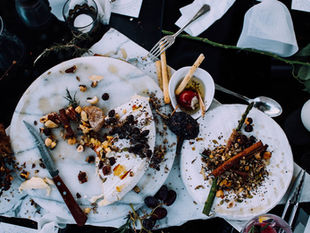
Taking the first step is always a hardest.
Let us help you find the right tool to make true compost!
Choosing an electrical composter can be tricky with so many options. To make it simple, we've highlighted the main differences between Reencle and other Dehydrator-type composters.
Don’t Burn, Simply Churn!
Check Point 1 - Running Temperature
As the name imply, dehydrator-type composters focuses on removing moisture to reduce waste volume and weight. To achieve this, dehydrator-type composters rely primarily on high temperatures to evaporate the moisture quickly - some claim to operate at over 100°C (212°F). However taking away moisture does not transform the food waste into compost. To make real compost, nature must be allowed to do its work by allowing bacteria to decompose the food waste and these bacteria does its work best between a temperature range of 40~65°C (104~149°F).
Traditional hot compost piles peak at 66°C to preserve microbes and this threshold is where the thermophilic bacteria thrive to decompose organic materials. However, the combination of steam and high temperatures in dehydrator sterilizes food scraps (since the bacteria dies and stop working), presenting a hurdle for composting.
In contrast, Reencle takes a different approach, maintaining an optimal temperature range of 55~60°C (131~140°F), together with constant churning to aerate and mix the food scraps. This allows our patented microbes to actively participate in accelerated decomposition when food scraps are introduced to the microbial bed in the chamber. The result is a thriving community of live and active microbes, ensuring efficient and effective composting!

Dried food waste is NOT Compost!
Check Point 2 - Do they produce real compost/fertilizer?
Many dehydrator-type composters showcase the convenience of using the dried material in potted plants, but a word of caution is in order. Here's why you might want to think twice:
The majority of our daily food intake contains sodium chloride (table salt), especially processed and canned foods, which can elevate salt levels. Dehydrating these food scraps without addressing the salt content essentially results in a sodium-concentrated food waste "jerky."
Composting, ideally, should transform organic waste into nutrient-rich fertilizer. However, high sodium levels in the “jerky” compost, stemming from dehydrated food with concentrated sodium, can be detrimental to both plant growth and soil health. It's crucial to be aware of this sodium concern when utilizing dehydrator-type composters. Regular monitoring of compost quality becomes imperative for ensuring optimal results in gardening or landscaping projects.
Also, CalRecycle.org (California Department of Resources Recycling and Recovery, is a state agency in California) literally states that “Dried food waste isn't compost”; true compost is the outcome of a prolonged chemical-biological degradation process, taking weeks or months.
Dehydrators can minimize odors and vectors in dry output. However, when applying these dried food waste to plants, the food waste becomes rehydrated when it comes into contact with raining and regular watering, may lead to issues like mold growth, attracting vectors, odors, and health concerns as it rots.

What Sets Reencle Compost Apart?
Reencle distinguishes itself by emulating the natural environmental degradation process within its chamber, leveraging a unique microbial mix which are thermophilic (high heat tolerant), halophilic (resistant to high salinity) and acidophilic (thrives in acidic environment) and able to breakdown short-chain fatty-acid which causes bad odor. Unlike simple and ordinary drying method, Reencle's microbes facilitate fermentation and biological decomposition of food waste, achieving a remarkable 90% weight and volume reduction in as little as 24 hours.
Reencle's legitimacy is underscored by robust compost testing, revealing substantial reductions in sodium levels post-composting and consistently high-quality compost across diverse testing criteria. Notably, Reencle compost avoids rehydration issues and methane production in landfills, offering a sustainable solution to the food waste problem and mitigating greenhouse gas emissions, topics we will delve into in upcoming articles.
In summary, when choosing between Reencle and Dehydrator composters, the key lies in their approach and outcomes. While Dehydrators may face challenges like rehydration and concentrating sodium, Reencle excels with a natural microbial-driven process, yielding high-quality compost.

*A crucial reminder: While Reencle expedites the composting process, it's essential to cure the compost for an extended period. The longer curing time ensures maturation and the complete breakdown of remaining food scraps, ultimately transforming them into nutrient-rich fertilizer!




